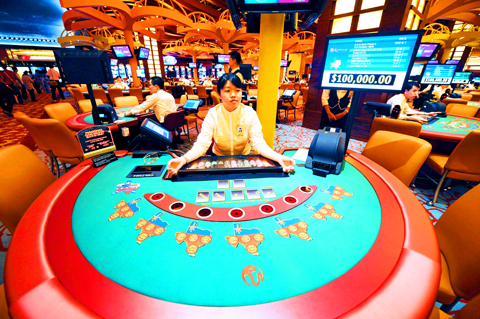Singapore’s first casino opened for business yesterday as the first punter was allowed into the gaming section of Resorts World Sentosa complex.
The opening — to be followed within months by a second casino resort — is part of a multibillion-dollar effort to transform Singapore’s tourism industry.
The doors to the cavernous and carpeted casino were thrown open to the public at 12:18pm on the first day of the Year of the Tiger in the lunar calendar.

PHOTO: AFP
When pronounced in the Cantonese dialect, 12:18 sounds like “prosperity.” A middle-aged Singaporean woman was the first gambler allowed in, followed by an initial crowd of about 200.
The US$4.4 billion resort features Southeast Asia’s first Universal Studios movie theme park, which also opened for a week of sneak previews from yesterday.
“We have waited a long time for this. Today’s opening of the casino is a milestone for Resorts World Sentosa, for Genting Group and for Singapore,” Genting Group chairman Lim Kok Thay (林國泰) said in a ceremony before the doors opened.
“We couldn’t have asked for a better time to open,” he said, referring to Asia leading the world in recovering from the worst global recession since the 1930s.
Singapore’s second casino, Marina Bay Sands, is being completed by the US-based Las Vegas Sands and is expected to open in April.
Officials hope the casinos will help Singapore achieve its target of 17 million visitors a year generating more than US$21 billion by 2015, boosting the services sector and reducing the role of manufacturing in the economy.
A lion dance and firecrackers preceded the opening of the casino.
Resorts World Sentosa last month opened four premium hotels and is testing the rides at the Universal Studios theme park before it is fully opened to the public.
Singapore in 2005 agreed to go ahead with two casino resorts after a rare public debate.
Opponents fear gambling would threaten Singapore’s “family values” reputation and put it at risk of becoming a center for money-laundering.
As a “social safeguard,” Singaporeans will have to pay S$100 a day (US$70) to enter the casinos.

TECH CLUSTER: The US company’s new office is in the Shalun Smart Green Energy Science City, a new AI industry base and cybersecurity hub in southern Taiwan US chip designer Advanced Micro Devices Inc (AMD) yesterday launched an office in Tainan’s Gueiren District (歸仁), marking a significant milestone in the development of southern Taiwan’s artificial intelligence (AI) industry, the Tainan City Government said in a statement. AMD Taiwan general manager Vincent Chern (陳民皓) presided over the opening ceremony for the company’s new office at the Shalun Smart Green Energy Science City (沙崙智慧綠能科學城), a new AI industry base and cybersecurity hub in southern Taiwan. Facilities in the new office include an information processing center, and a research and development (R&D) center, the Tainan Economic Development Bureau said. The Ministry

ADVERSARIES: The new list includes 11 entities in China and one in Taiwan, which is a local branch of Chinese cloud computing firm Inspur Group The US added dozens of entities to a trade blacklist on Tuesday, the US Department of Commerce said, in part to disrupt Beijing’s artificial intelligence (AI) and advanced computing capabilities. The action affects 80 entities from countries including China, the United Arab Emirates and Iran, with the commerce department citing their “activities contrary to US national security and foreign policy.” Those added to the “entity list” are restricted from obtaining US items and technologies without government authorization. “We will not allow adversaries to exploit American technology to bolster their own militaries and threaten American lives,” US Secretary of Commerce Howard Lutnick said. The entities

Minister of Finance Chuang Tsui-yun (莊翠雲) yesterday told lawmakers that she “would not speculate,” but a “response plan” has been prepared in case Taiwan is targeted by US President Donald Trump’s reciprocal tariffs, which are to be announced on Wednesday next week. The Trump administration, including US Secretary of the Treasury Scott Bessent, has said that much of the proposed reciprocal tariffs would focus on the 15 countries that have the highest trade surpluses with the US. Bessent has referred to those countries as the “dirty 15,” but has not named them. Last year, Taiwan’s US$73.9 billion trade surplus with the US

The Taipei International Cycle Show (Taipei Cycle) yesterday opened at the Taipei Nangang Exhibition Center, with the event’s organizer expecting a steady recovery in the industry this year following a tough last year. This year, 980 companies from 35 countries are participating in the annual bicycle trade show, showcasing technological breakthroughs and market development trends of the bicycle industry at 3,600 booths, the Taiwan External Trade Development Council (TAITRA, 外貿協會) said in a statement. Under the theme “Ride the Revolution,” the exhibition has attracted more than 3,500 international buyers from 80 countries to preregister for the four-day event, which is expected to